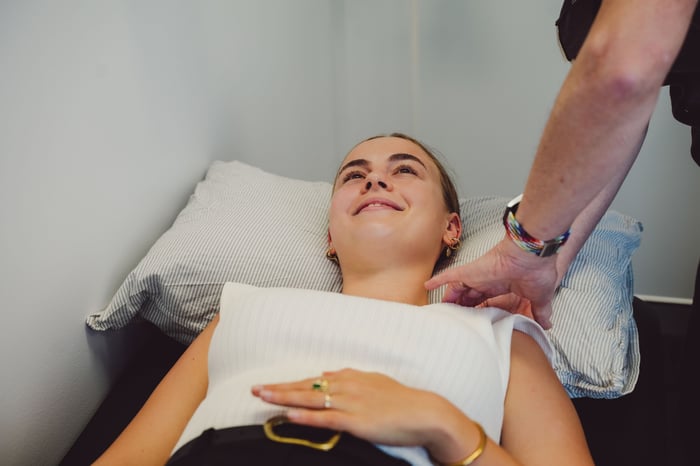Caring for the Carer: Food, Movement & Connection After Birth
Recovery is a team effort
After birth, attention often centres on the baby - and the person who carried and birthed them. But real recovery thrives when the whole household heals together. Partners and carers play a pivotal role: creating time, structure and emotional space for rest, nourishment, and movement.
When care is shared, recovery isn’t just faster - it’s deeper, more connected, and protective for everyone’s wellbeing.
How support changes recovery
Simple acts from a partner - making meals, refilling water bottles, or guarding rest time - have measurable impact. Research shows that when new parents receive consistent household and emotional support, they report fewer depressive symptoms, better sleep, and faster physical recovery (O’Connor et al., 2025; Beamish et al., 2024).
But recovery support goes beyond logistics. It’s also about:
- Encouraging self-care: making space for short walks, stretching, or physio exercises.
- Sharing routines: alternating feed prep, nappy changes, or bedtime to reduce fatigue.
- Meal and supplement support: ensuring easy access to high-iron, high-protein meals and postpartum supplements recommended by a GP or dietitian.
💡 When a partner prepares nourishing meals or schedules rest breaks, they’re not just helping - they’re actively shaping recovery outcomes.
Movement and exercise: a shared path to connection
Gentle exercise isn’t only for physical healing - it can be a powerful emotional connector. Couples who walk, stretch, or train together in the postpartum period report stronger bonds, less tension, and improved sexual satisfaction six months later (Beamish et al., 2024; Zhang et al., 2025).
For many, exercise becomes the first shared ritual that isn’t centred on the baby.
- A 10-minute daily walk builds routine and mood stability.
- Breath-based core work helps reconnect both partners to movement and mindfulness.
- When guided by a pelvic health physiotherapist, exercise can safely progress from gentle mobility to shared strength sessions or return to sport.
🧠 Movement releases endorphins and improves circulation - both protective against postpartum depression in mothers and fathers alike.
Intimacy and sexual health: part of recovery, not an afterthought
Up to 85% of women experience sexual discomfort or low libido in the months after birth, often linked to fatigue, hormonal change, and pelvic floor recovery. Open communication and gradual physical reconnection are key.
Partners can:
- Recognise that pain or avoidance is common but treatable - not a sign of disinterest.
- Encourage professional help: a pelvic health physiotherapist can address muscle overactivity, scarring, or confidence concerns.
- Focus on emotional closeness first - touch, presence, humour, and patience restore safety long before intercourse returns.
🌸 Pelvic health physiotherapy supports not only muscle recovery but also body confidence and intimacy - for both partners.
Whole Recovery Summary
- Share the load. Partners who protect rest, prepare food, and support exercise speed recovery for both.
- Move together. Gentle joint activity builds confidence, connection, and mood stability.
- Feed the foundation. Prioritise nutrient-dense meals, hydration, and supplements as advised.
- Talk early. Pain, fatigue or intimacy concerns deserve open conversation and professional care.
🌿 Caring for the carer isn’t selfless - it’s strategic. When recovery is shared, the whole family thrives.
Ready to take the next step?
- Nourish: Explore Whole Bowl Co.’s postpartum meal range →
- Restore: Book your Pelviology couples or postnatal check-up →
References
Beamish, N. F., Davenport, M. H., Ali, M. U., & McIntyre, E. A. (2024). Impact of postpartum exercise on pelvic floor disorders and diastasis recti abdominis: A systematic review and meta-analysis. British Journal of Sports Medicine, 59(8), 562–569. https://doi.org/10.1136/bjsports-2024-108746
O’Connor, H., Meloncelli, N., Wilkinson, S. A., et al. (2025). Effective dietary interventions during pregnancy: A systematic review and meta-analysis of behaviour change techniques to promote healthy eating. BMC Pregnancy and Childbirth, 25, 112. https://doi.org/10.1186/s12884-025-07185-z
Ozanne, S., Jones, A., & Reynolds, R. M. (2025). Challenges with developing nutritional recommendations to improve pregnancy outcomes. BMJ, 389, e081325. https://doi.org/10.1136/bmj-2024-081325
Zhang, Y., Chen, L., & Teng, Y. (2025). Effectiveness of pelvic floor muscle strength training to prevent and treat urinary incontinence in postpartum women: A systematic review. Journal of Obstetrics and Gynaecology Canada, 47(4), 421–430. https://doi.org/10.1016/j.jogc.2025.02.012

